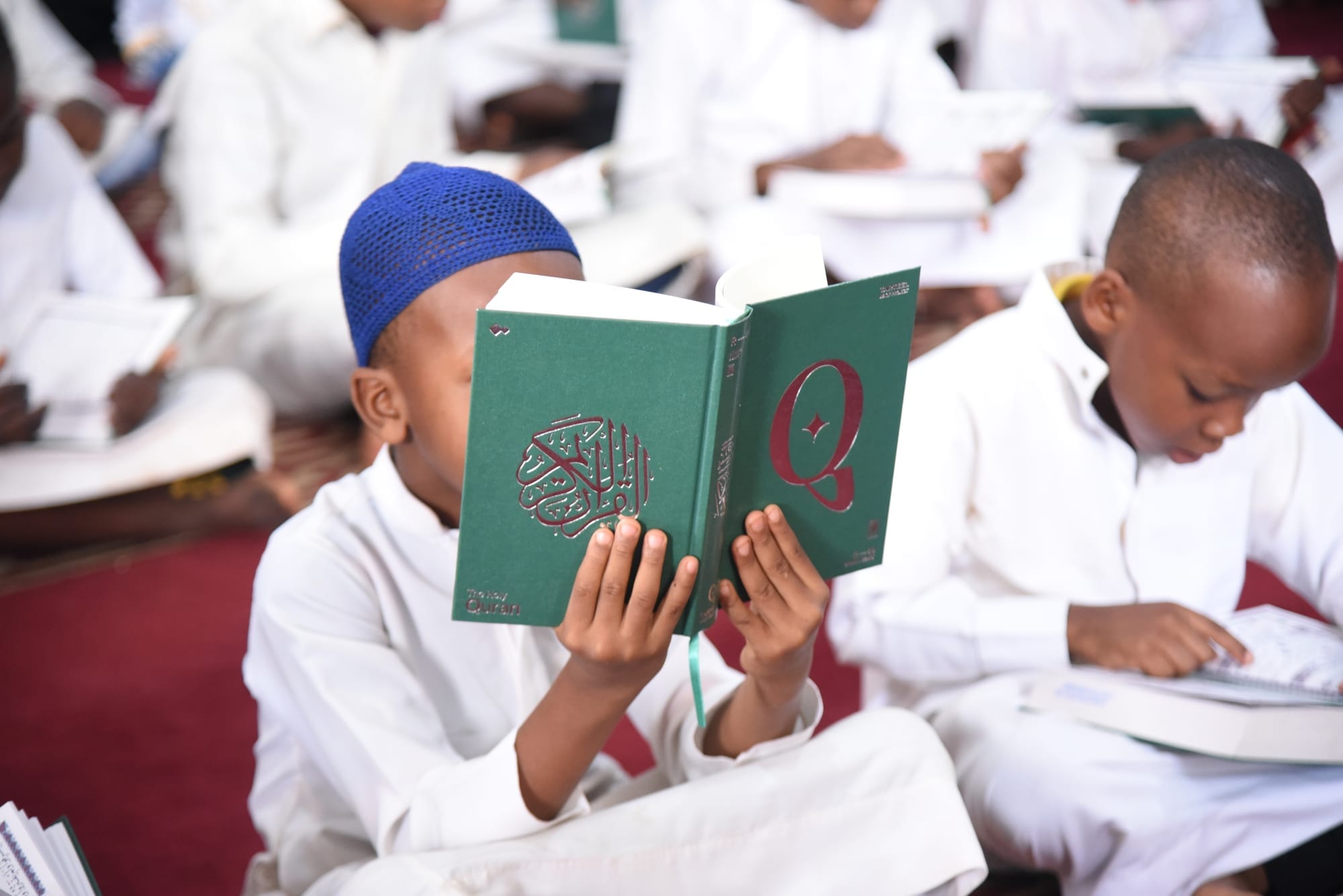The memorization of the Quran, known as Hifz, is one of the most revered and spiritually enriching practices in Islam. This sacred tradition, deeply rooted in the Islamic faith, was exemplified by the Prophet Muhammad ﷺ and his companions over 1,400 years ago. Their dedication to preserving the words of Allah has not only ensured that the Quran remains unchanged but has also inspired generations of Muslims to undertake the journey of memorizing the holy text. Understanding how the Prophet and his companions approached Quranic memorization offers invaluable insights into both the spiritual and practical aspects of Hifz, making it a powerful example for Muslims today.
A History of Hifz⌛
As Muslims, we're guided by the wisdom and decree of Allah SWT in the form of the Quran and the Sunnah of our beloved Prophet. It's the ultimate blueprint for how to live and there's a lot to learn from our pious predecessors. Just as we're guided in matters of deen, family, work, community and achieving the pleasure of Allah, so too can we draw inspiration from the past on seeking knowledge and more specifically, how to memorize the Quran. Let's take a walk through history and see what we can learn about the tradition of hifz through the lens of our Prophet ﷺ and his companions.
The Beginning of Quranic Revelation🕯️
The journey of Quran memorization began with the Prophet Muhammad himself. He would receive revelations from Allah (SWT), which he would memorize instantly. Allah says in the Quran: "Do not rush your tongue trying to memorize ˹a revelation of˺ the Quran. It is certainly upon Us to ˹make you˺ memorize and recite it." (Quran, 75:16-17). This divine assurance highlights that the Prophet’s memorization was a miraculous, divinely facilitated process. The first revelation was communicated to him through the Angel Jibreel (AS).
Early Methods of Memorization🗣️
Initially, the Quran was not written but was memorized and orally transmitted. The Prophet played a pivotal role in this. Upon receiving the revelations, he would recite them to his companions, who would then memorize and disseminate them. It is believed that whenever a verse from the Quran was revealed, the Prophet would call upon some scribes to dictate its words to them.
Interested in the oral tradition of the Quran and how it came to be the physical mushaf you know today? Learn its history, here👇

The Role of the Prophet’s Companions🤝
The companions of the Prophet, known as Sahaba, were eager to learn and memorize the Quran. Notable among them were Abu Bakr, Umar ibn Al-Khattab, Uthman ibn Affan, Ali ibn Abi Talib, and Abdullah ibn Mas’ud. Their dedication was profound, as they understood the responsibility of preserving the Quran. A hadith in Sahih Al-Bukhari narrates that the Prophet said, "The best among you (Muslims) are those who learn the Quran and teach it." and so this became common practice among Muslims at the time with the Quran being taught and shared widely among families and communities, generation to generation.
Memorization in the Prophet’s Mosque🕌
The Prophet’s mosque in Madinah served as a central hub for Quranic learning and memorization. Groups would gather to recite and memorize the Quran in circles, a tradition known as Halaqas. The Prophet would listen to his companions’ recitations, correct their mistakes, and provide guidance, emphasizing the importance of accurate and mindful recitation. You're probably wondering which methods they used to memorize the Quran and while we're in no position to speculate or provide anything close to a definitive ruling, some narrations point to certain techniques like memorizing in small portions as you'll see below.
The Quran was revealed over 23 years and the Sahabah used to take it very slowly to memorize usually taking just 10 ayahs at a time until they fully understood them, applied them to their life, and memorized them before even thinking about moving on.
Abu 'Abdur Rahmān (may Allāh be pleased with him) reported: The companions would learn to recite ten verses from the Messenger of Allāh (ﷺ). They would not take another ten verses until they understood the knowledge and deeds they contained. They would say, “We learned sacred knowledge and action together.” (Musnad Aḥmad 22971)
It is narrated by Abu Nadrah (may Allāh be pleased with him) that, “We used to learn from Abu Sa’īd al-Khudrī (may Allāh be pleased with him) five verses in the morning, and five in the evening, for he told us that Jibreel (peace be upon him) used to bring (on average) five verses at a time.” (Ibn Asākir's Tārīkh Damishq, al-Itqān)
Al-Imām Ibn Jazarī mentioned that the companions used to recite three by three (meaning three at a time), five by five meaning five at a time), and ten by ten (meaning ten at a time) and would not exceed this amount. This was the case for repetition (talqīn) and new memorization. (Munjad al-Quqri'īn, Murshid at-Tālibīn, Akhlāq Hamalat al-Qur'ān lil-Bukhārī)

What Can We Learn From Their Methods?💭
- It's not a race: take the time to really make sure you're doing right by the act of engaging with the Quran and giving it the respect and honour it deserves.
- Smaller portions ftw: it's easy to feel like we need to take a chapter a day to see any progress but that's simply not the case! Memorizing the Quran in smaller chunks is easier on your mind and your schedule.
- Make the most of it: bask in the barakah that comes with memorizing the Quran! It's a great opportunity for reflection and increasing closeness with Allah.
Tips for Memorization⚙️
- Repetition: Repetition was a key tool. The Prophet (PBUH) encouraged reciting repeatedly for better retention. A hadith states that: Abu Musa Al-Ash'ari (May Allah be pleased with him) reported: The Prophet (ﷺ) said, "Read the Quran regularly. By the One in Whose Hand Muhammad's soul is, it escapes from memory faster than a camel does from its tying ropes." [Riyad as-Salihin 1002.]
- Understanding and Reflection: Understanding the meanings are crucial. Allah says in the Quran: "Do they not then reflect on the Quran? Had it been from anyone other than Allah, they would have certainly found in it many inconsistencies." (Quran, 4:82). This encouraged deeper engagement with the text, aiding memorization.
- Teaching Others: Teaching was another method and it's often said that the best way to consolidate your learning on something is to teach it to someone else.
- Consistency: Regular and consistent recitation was vital. Abdullah ibn Umar narrated, "The Prophet (PBUH) said: 'The parable of one who knows the Quran by heart is as the owner of tethered camels. If he keeps a hold on them, he will keep them, but if he releases them, they will go away.'" [Sahih Al-Bukhari 5031].
Memorization and Preservation Post-Prophet’s Era⏩
After the Prophet’s death, the task of preserving the Quran became more crucial. During Caliph Uthman’s time, the Quran was compiled into a single book form to ensure its preservation and uniformity. This effort was led by Zaid ibn Thabit, a companion known for his memorization skills, ensuring the Quran we have today is as it was revealed.
The Take Home📖
The tradition of memorizing the Quran, established by the Prophet Muhammad and his companions, is a testament to their devotion and commitment to preserving Allah’s words. Their methods - repetition, understanding, teaching, and consistency - remain the cornerstone of hifz even today. This practice is not just about preserving text but is an act of worship, a means to attain closeness to Allah (SWT), and a way to live the teachings of Islam. As we reflect on this legacy, we are reminded of the words of the Prophet: "The Quran will either be a proof for you or against you on the Day of Judgment" [Sunan Ibn Majah 280].






